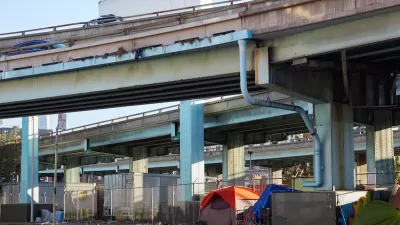The innovative housing program launched during the pandemic has made a significant difference for unhoused individuals, but long-term support remains underfunded.

Carolina Reid summarizes California’s Homekey Program: Unlocking Housing Opportunities for People Experiencing Homelessness, a report from Berkeley's Terner Center for Housing Innovation that assesses the successes and challenges of the innovative housing program. "Developed in the midst of the COVID-19 pandemic, Homekey provides local public entities with large, capital grants that can be used to purchase existing buildings and convert them into housing for people experiencing or at risk of homelessness."
According to the blog, "All told, Homekey 1.0 added 6,000 rooms and/or units to the state’s supply of interim and permanent housing in under six months, at an average initial cost of $238,000 per unit," less than half the average cost of building an affordable housing unit in California.
"We find that Homekey’s grant structure–coupled with giving jurisdictions flexibility in how to use the funds–allowed them to move quickly to respond to local needs." Additionally, "Homekey’s emphasis on speed—facilitated by regulatory streamlining—made all the difference in how quickly localities were able to get people housed."
Reid notes that "For all its strengths, Homekey remains embedded within an underfunded and fragmented affordable housing system. This means that many properties do not have sufficient funding to support long-term operations—this remains the single largest challenge and concern for Homekey grantees." According to the report, "The resources to support resident well-being—including case management, health care, and mental health and/or substance use counseling—also remain well below need."
Reid concludes that the rapid deployment of Homekey shows promise, but the state must continue to support the program with appropriate resources for long-term success.
FULL STORY: California’s Homekey Program: Unlocking Housing Opportunities for People Experiencing Homelessness

Alabama: Trump Terminates Settlements for Black Communities Harmed By Raw Sewage
Trump deemed the landmark civil rights agreement “illegal DEI and environmental justice policy.”

Planetizen Federal Action Tracker
A weekly monitor of how Trump’s orders and actions are impacting planners and planning in America.

Why Should We Subsidize Public Transportation?
Many public transit agencies face financial stress due to rising costs, declining fare revenue, and declining subsidies. Transit advocates must provide a strong business case for increasing public transit funding.

Understanding Road Diets
An explainer from Momentum highlights the advantages of reducing vehicle lanes in favor of more bike, transit, and pedestrian infrastructure.

New California Law Regulates Warehouse Pollution
A new law tightens building and emissions regulations for large distribution warehouses to mitigate air pollution and traffic in surrounding communities.

Phoenix Announces Opening Date for Light Rail Extension
The South Central extension will connect South Phoenix to downtown and other major hubs starting on June 7.
Urban Design for Planners 1: Software Tools
This six-course series explores essential urban design concepts using open source software and equips planners with the tools they need to participate fully in the urban design process.
Planning for Universal Design
Learn the tools for implementing Universal Design in planning regulations.
Caltrans
Smith Gee Studio
Institute for Housing and Urban Development Studies (IHS)
City of Grandview
Harvard GSD Executive Education
Toledo-Lucas County Plan Commissions
Salt Lake City
NYU Wagner Graduate School of Public Service





























